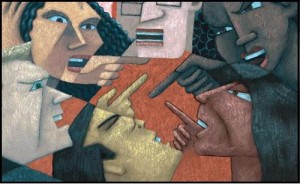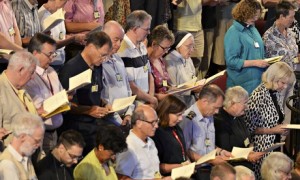
Before others and above all, special care must be taken of the ill so they may be looked after, as Christ.
What is an infirmarian to do with my sickness?
It was ironic that, on the week I was reflecting on how a community cares for the sick, I got sick. My sickness was not a commonly accepted sickness and many people question whether we should classify what I am still suffering with as a ‘sickness’ but for me there were physical symptoms which hindered me from functioning as well as I can and therefore it is a sickness like any other. My sickness was stress related and was a mental sickness: depression.
I am prone to this sickness like some are to colds and flus, to migraines and back problems. I am aware that I can be ‘crippled’ by this sickness if not kept in check. The symptoms for me (as I am aware people suffer with this in different ways) are an overwhelming sense of apathy, weariness, chest pains, inability to sleep, stomach cramps and unexpected waves of sadness and weeping. I am often loathed to name this sickness ‘depression’ because of the various versions of it and reasons for it: some are biological and hormonal others are circumstantial and based on the interaction between personality and environment/culture. Mine is not majorly biological but rather the way I function doesn’t, pre heavenly state of being, lend itself to easily coping with certain situations. Trying to manage these symptoms and counter them is difficult and is made more difficult when trying to function normally.
I am not one for hiding problems but this illness has a stigma particularly if you are a leader and teacher. This illness is deemed as a weakness and a failure in greater and lesser degrees. People judge you as the cause of the sickness and when you fail to function like normal you are blamed for not being able to control yourself and your body. Outside of the sickness I can see how this response comes about and there is a certain regime one should develop to live with mental health sickness. When you are overwhelmed by the darkness and despair it is so easy to fall into blaming yourself for your relapse but that makes things worse.
The problem I have found with this current bout of sickness is how it is, for me, externally triggered but that doesn’t mean that the trigger is the sole blame for it. It is the mixture with many other factors including my personal state of mind and, yes, body. If I am tired (like everyone gets sometimes) then I’m more vulnerable. Here again the sickness is like the common cold for me: if I am low on energy to fight the virus then I will knocked by it so, in order to not catch colds, I need to keep my energy up. Also, like the common cold, there is an external trigger, someone gives you a cold, but the solution to that is to not be around anyone. This is stupid and unrealistic so there’s always a danger of contracting it but I need to look after myself.
Despite it being a sickness there is not a simple cure for it (aside from medication which I have issues with, personally). Each person and each triggered relapse requires different ‘cures’ or strategies. I find preventative measures much more helpful than reactionary diagnosis and aid. I’d rather find better ways to protect myself from falling ill rather than to keep falling ill and having to wait for things to ease. It is easier, in my mind, to learn how to manage the external triggers rather than to be blind to them and be surprised every time to begin to suffer.
The complication for me comes when my ministry requires me to live so close to so many potential triggers. My personality/spirituality/theology are based largely on being vulnerable, committing to deep relationship with others and to engaging in a very real battle between darkness and light. This means that I find myself placed in situations which I am called to stand with people in brokenness, burden and the darknesses of this world. For someone who is easily tempted to despair this is not a great place to be for long periods of time but I do not feel it is God’s will for me to avoid such situations; in fact, I am witness to the powerful way in which God is redeeming this approach to life and discipleship in powerful ways for people. I’m not just talking about a basic understanding for people in a situation but actually of taking off the other their burden and sharing the weight, feeling the pain of loss and the void of hopelessness. I do that with the full knowledge and faith in Christ the Light of the world.
Being in these situations I know my own complete dependance on God to sustain me and to uphold me. I genuinely cry out for both myself and the person who’s burden I am sharing. I know that, if I don’t turn to God, I will fall and I will suffer. This does mean, however, that when I suffer with despair it is so easy for me to think,
I clearly was not with God nor dependant on him.
This makes me feel as though I have failed and beat myself further into a miry pit.
Having people around me concerned for my wellbeing is nice, to a point, but how am I to be taken care of? What is an infirmarian to do with my sickness?
This is a question I am still wrestling with and it is made more acute when I look at the Church of England and the structures in place for its leaders (lay and ordained). What support and healing is available and realistic? Who is the Diocesan Infirmarian and how might healing work within the pressures of full-time ministry?
Without dismissing anyone who is ‘weak’ enough to suffer from this inability to cope with the pressures of ministry and who can’t divorce their own lives from others to protect themselves from deep, gut-wrenching compassion what is the Church of England to do? Is there a way that people like me can be surrounded and supported, like Moses was with Hur and Aaron (Exodus 17), to be used by God in this ministry of vulnerability and compassion?
Most ministers I know either suffer in silence or develop divorcing techniques from the cause of the problem. Neither really changes the situation; both are avoiding the deeper issues. If you just ‘cope’ and accept reality as unchangeable (or at best ‘long term and complicated’) then you lose any hope of your situation changing; you’re trapped and must change to deal with it or succumb to a kind of death. If you develop divorcing techniques such as, refusing to enter fully into the emotion of conflict and/or other’s painful experience, distraction from reflecting too much on complex landscape of the mess of the world or just repeating over and over, ‘it’s all fine really’ then you ignore the problem and it is only a matter of time before you can ignore it no more.
So what are my conclusions? What are the answers to my questions? I’m afraid I don’t know entirely but here is my best stab in the dark (and it really feels dark at times)…
The isolation model of most parish ministers is unhealthy for the kind of work that we are called to engage with. I would be surprised if many parish priests would not admit to feeling lonely at some point. Fortunately many full-time ministers (lay and ordain) gather round them teams of people but, because of the responsibility and the oversight role they hold it is difficult to be open and honest at certain times. There might be more fruit in sharing the full responsibility and pressures of leadership in peer groups, with the overall care of the team of peers being placed with the abbot (bishop) and deans together.
When one of the ministers falls sick then the others come around and fulfil the work. An infirmarian is called in and the sick minister is taken to a place to heal knowing that the work continues in the way that it was started.
Unfortunately, due to the centralisation of power that tends to be executed in the Church of England the powers to act and support are so far removed from the parish that it can feel like you are neglected. It takes so long to get hold of the busy bishop or arch-deacon.
I am aware that in some cases this works well but the system is a strained model which needs looking at.
Reflection
As I still struggle with my illness, without an effective infirmarian or ‘cure’, I am acutely aware of how my approach to ministry and how God has shaped and continues to use me doesn’t work within the Church of England generally. I am aware that my theology and particular call is not the liberal, at times cynical and altogether ‘pragmatic’ approach of the majority of the Church of England and that what I desire is an intentional community of discipleship who share life together: prayer together, study together and mission together. To put it simply I am monastic and the Church of England is not.
There is something, I feel, to be had if we were to ask the question of the larger system and institution of the Church of England. That question is this:
What if every parish church was either a) a monastery with the powers devolved to enable it to function or b)the parish is seen as one equal but distinct part of a wider monastic community of a deanery in prayer, study and mission together?
As I struggle to see a way out of the forest of my current plethora of external triggers to my sickness, I am forced to reflect on the role of a curacy. This is a much bigger topic than can be dealt with here but I want to voice a hunch that if we see the role of college training as a powerhouse of discipleship and preparation why is there a big disconnect between it and parish training? Is there any scope in developing a training programme which continues on that process of a placing curates (and maybe all full time ministers) into a community that live together, praying, studying and engaging in mission? As we welcome new people in other employment we develop and grow that community which is fed from the local centre of monastic rhythm.
Lots of thoughts on that: anyone willing to talk to me and dream with me on that?
Loving Father, you know my prayers, the silent sighs and groans tune in with your Spirit who intercedes for us, “Abba Father”. That is a prayer not just as a cry from a nightmare to be embraced and brought close to you but also as a statement of refuge and strength.
Come, Lord Jesus
 Who has the right to the land of Gaza and the West Bank? We could start by going into all the history and legalities over this issue. The use of words such as ownership can then be brought into question. Historical facts could then be muddied by interpretation of events and phrasings and then there’s the insurmountable obstacle of personal stories and the tangled web of historical violence from both sides.
Who has the right to the land of Gaza and the West Bank? We could start by going into all the history and legalities over this issue. The use of words such as ownership can then be brought into question. Historical facts could then be muddied by interpretation of events and phrasings and then there’s the insurmountable obstacle of personal stories and the tangled web of historical violence from both sides. Winning arguments is easy if you can just wear down your opponent and the easiest way to do that is keep moving the goal posts; re-define the terms of the argument until it gets too complicated and they get confused and worn out. You don’t need truth to do this; all you need is stamina and intelligence.
Winning arguments is easy if you can just wear down your opponent and the easiest way to do that is keep moving the goal posts; re-define the terms of the argument until it gets too complicated and they get confused and worn out. You don’t need truth to do this; all you need is stamina and intelligence. In November 2012 General Synod’s motion to vote female bishops failed, only just but enough. What was clear back then was that the debate had been established on the principle that there was an ‘us’ vs. ‘them’. The aim was not to discover wisdom but to ‘win’ at any cost. Both parties on the extremes didn’t seem to care how they would win just as long as they did. This week, however, the tone of the debate was not on winning points and persuasion but a genuine, heartfelt desire to seek wisdom and to trust one another. The debate stopped being about party politics but more about seeking genuine peace and wisdom only found in the Spirit of God.
In November 2012 General Synod’s motion to vote female bishops failed, only just but enough. What was clear back then was that the debate had been established on the principle that there was an ‘us’ vs. ‘them’. The aim was not to discover wisdom but to ‘win’ at any cost. Both parties on the extremes didn’t seem to care how they would win just as long as they did. This week, however, the tone of the debate was not on winning points and persuasion but a genuine, heartfelt desire to seek wisdom and to trust one another. The debate stopped being about party politics but more about seeking genuine peace and wisdom only found in the Spirit of God. To dismantle such a fence of division takes time, building trust and relationship something sadly lacking in our politics in this country. My very public critique of the Same Sex Marriage Bill was not based on some personal, moral judgement on homosexuality but on the way a decision was being sought. It was rushed. The lobbyists pressured opponents with the supposed lack of time and bullied people into making a response; to choose a side of the fence. Rather than taking the fences down they were happy to keep them there. People were forced off the fence onto one side or the other and it was all done by the manipulation of language. The same is being done with The Assisted Dying Bill.
To dismantle such a fence of division takes time, building trust and relationship something sadly lacking in our politics in this country. My very public critique of the Same Sex Marriage Bill was not based on some personal, moral judgement on homosexuality but on the way a decision was being sought. It was rushed. The lobbyists pressured opponents with the supposed lack of time and bullied people into making a response; to choose a side of the fence. Rather than taking the fences down they were happy to keep them there. People were forced off the fence onto one side or the other and it was all done by the manipulation of language. The same is being done with The Assisted Dying Bill.